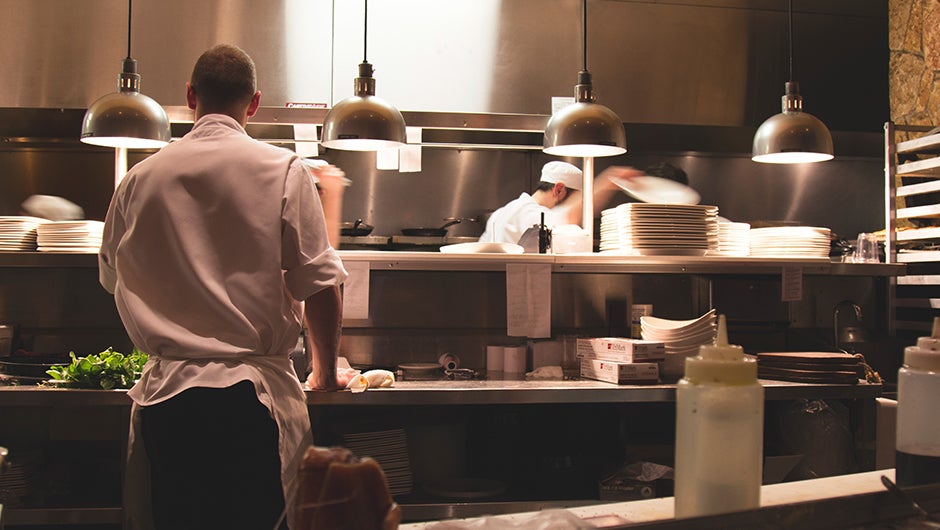Blockchain in the Kitchen: Revolutionizing the Culinary World with Crypto

Blockchain in the Kitchen Revolutionizing the Culinary World with Crypto
The world of cooking and cuisine is about to get a major upgrade with the introduction of blockchain technology. Blockchain, the revolutionary digital ledger system that powers cryptocurrencies like Bitcoin, is now being used in the kitchen to revolutionize how chefs create their dishes. By utilizing smart contracts and other features of blockchain technology, chefs can take advantage of its distributed nature to store recipes securely, track ingredients for quality assurance purposes, automate payments between parties involved in food production and distribution chains, and even use cryptocurrency as a form of payment.
For example, some restaurants are already using blockchain-based platforms such as FoodCoin or VeChain Thor to track their ingredients from farm-to-table. This helps them ensure that they are getting high quality produce while also allowing customers to trace where their meal came from so they know exactly what’s on their plate. Additionally, these systems make it easier for farmers and suppliers to be paid quickly without having to wait weeks or months for payment processing times associated with traditional methods like checks or credit cards.
Another way blockchain is transforming the culinary industry is through automated payments between producers and distributors within supply chains. With smart contracts written into blockchains such as Ethereum or Hyperledger Fabric, businesses can set up automated transactions which will execute when certain conditions have been met - ensuring timely payments across multiple stakeholders without any manual intervention required by either party involved in the transaction process.
Finally, one exciting development coming out of this space is cryptocurrency being accepted at restaurants around the world as an alternative form of payment for meals consumed there (or delivered). Restaurants such as KFC Canada have started accepting Bitcoin Cash (BCH) while others are offering discounts if you pay with crypto tokens like Litecoin (LTC). As more people become comfortable using digital currencies instead of fiat money for everyday purchases we could see a rapid adoption rate amongst restaurant owners looking to capitalize on this new trend before anyone else does!
In conclusion, it's clear that blockchain technology has huge potential when it comes to revolutionizing how we cook our meals – from tracking ingredients all the way through automating payments between different stakeholders within food production/distribution networks – making sure everyone gets paid promptly whilst also providing customers with peace-of-mind knowing exactly where their dinner came from! Furthermore adding cryptocurrency acceptance at restaurants opens up whole new possibilities when it comes time paying your bill after enjoying your meal! IDN Poker Online
The Basics of Blockchain in the Kitchen
The blockchain revolution is here, and it’s making its way into the kitchen. Blockchain technology has been around for a few years now, but its potential to revolutionize the culinary world is only just beginning to be explored. In this blog post, we’ll take a look at how blockchain can be used in the kitchen and what advantages it offers over traditional methods of cooking.
At its core, blockchain is an immutable ledger that records transactions between two or more parties without requiring any central authority to verify them. This means that data stored on the blockchain cannot be changed or deleted once it has been recorded - creating an incredibly secure environment for storing information about food production and preparation processes.
Blockchain technology also enables transparency in food supply chains by allowing consumers to trace their meals back through each step of production from farm-to-table. This could help eliminate problems such as food fraud (when ingredients are misrepresented) or mislabeling (when labels don't accurately reflect what's inside). It could also make sure that people know exactly where their food comes from so they can make informed decisions about what they're eating.
Finally, using smart contracts powered by blockchain technology would allow restaurants and other businesses in the culinary industry to automate certain tasks such as ordering supplies or paying vendors quickly and securely with cryptocurrency payments like Bitcoin or Ethereum instead of cash or credit cards. Smart contracts would also enable chefs to create custom recipes which can then be shared with others who have access to the same platform - potentially leading to new innovative dishes being created all over the world!
In conclusion, while there are still many challenges ahead before blockchain becomes widely adopted in kitchens everywhere, its potential applications within this space are immense - from increasing security and transparency throughout supply chains right down to automating mundane tasks with smart contracts - making life easier for everyone involved!
Benefits of Implementing Blockchain Technology in Culinary Practices
The blockchain technology has been revolutionizing the culinary world with its numerous benefits. It is a distributed ledger system that records and stores data in an immutable, secure, and transparent manner. This technology can be used to track food from farm to table, ensuring safety and quality control of ingredients. Additionally, it can help reduce costs associated with inventory management and provide greater visibility into supply chain operations.
Blockchain-based systems also offer advantages for restaurants when it comes to customer loyalty programs or payment processing solutions. By leveraging smart contracts on the blockchain network, restaurants are able to create automated reward systems for customers who frequent their establishments or purchase specific items regularly. Furthermore, these same smart contracts could be used to facilitate transactions between customers and vendors more quickly than traditional methods such as credit cards or cash payments would allow for faster service times at checkout counters while eliminating fraud risks associated with manual processes like double spending or identity theft concerns.
Finally, blockchain technology offers potential opportunities for chefs looking to monetize their recipes by creating digital tokens representing ownership rights over them which could then be sold on decentralized exchanges (DEXs). These tokens would represent a form of intellectual property protection as well as providing chefs with additional income streams outside of their regular restaurant business operations - allowing them more freedom in terms of creativity when designing new dishes without having worry about copyright infringement issues down the line!
Exploring the Potential for a Crypto-Powered Food Industry
The food industry is one of the oldest and most essential industries in human history. It has been an integral part of our lives since the dawn of civilization, providing us with sustenance, nutrition, and even entertainment. As technology advances, so too does the potential for a more efficient and secure food industry powered by blockchain technology.
Cryptocurrency has already made its mark on the world’s financial markets; now it is poised to revolutionize how we interact with food production and consumption as well. Blockchain-based solutions can be used to create transparent supply chains that allow consumers to trace their meals from farm to table while ensuring safe delivery practices are followed along every step of the way. This would not only provide peace of mind but also ensure quality control measures are met throughout all stages of production – from growing ingredients in sustainable farms right up until they reach your plate!
Additionally, cryptocurrency could also be used as a form of payment within this new system which would make transactions much faster than traditional methods like cash or credit cards. Not only that but crypto payments could also help reduce costs associated with processing fees due to their decentralized nature - meaning no middleman needed! Furthermore, digital wallets could store loyalty points or discounts for customers who frequent certain restaurants or buy specific products regularly – incentivizing them further towards making healthier choices when it comes time for dinner each night!
Finally, blockchain technology offers immense potential when it comes to tracking food safety issues such as recalls or contamination incidents. By creating immutable records that cannot be altered without permission from both parties involved (e.g., producers/distributors), any suspicious activity can quickly be identified and dealt with accordingly before reaching consumers’ plates – protecting everyone involved in the process from harm's way!
Overall, there is no doubt that cryptocurrency will play an increasingly important role in transforming how we interact with our meals going forward - giving us greater transparency into where our food comes from while allowing us access better deals at local eateries through digital wallets & loyalty programs alike! With all these benefits combined together under one roof - what’s not love about this kitchen revolution?
Home

